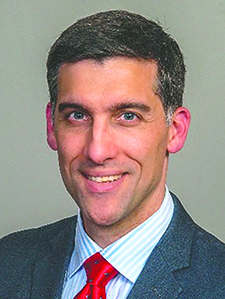Explore This Issue
June 2023As a resident in the otolaryngology–head and neck surgery department at Ohio State University in Columbus, Andrew Tompkins, MD, MBA, was surrounded by physicians and medical professors who had completed a fellowship program.
Dr. Tompkins, now an otolaryngologist at Ohio ENT & Allergy Physicians, knew he wouldn’t follow in their footsteps, at least not right away. He had made a commitment to join the military, so a fellowship right after residency was out of the question. But he felt the allure.
We may be at a saturation point where [the number of fellows is] as high as it’s going to get, but who knows what the future holds? —Andrew Tompkins, MD, MBA
“There was never any overt pressure with me, and I don’t necessarily know that there was with anyone in my residency, but I think it’s hard not to be taken in just with the exposure to the highly qualified, great surgeons I was surrounded by,” he said. “In any case, I probably couldn’t have gotten past the fact that I liked everything and wanted to be a generalist.” He never did pursue a fellowship.
Many physicians coming out of residency do end up taking a fellowship, but as the number of otolaryngologists doing so has risen in recent years, the field continues to consider the question of how many fellowship-trained subspecialists the field needs.
How Many Do We Need?
Dr. Tompkins is particularly thoughtful about the topic, as he chairs the American Academy of Otolaryngology–Head and Neck Surgery’s Workforce and Socioeconomic Task Force, which was created to identify the makeup of the otolaryngology workforce. The task force’s goal is to provide rich, transparent information about the field.
In a study published in 2021, researchers surveyed those taking the otolaryngology board oral exam. Over the eight-year study period from 2011 to 2019, 58% of respondents completed fellowships (Otolaryngol Head Neck Surg. 2021;165:655–661). In a comparison of individual years from the period, the percentage of respondents who completed a fellowship rose from 45.6% in 2011 to 61.5% in 2019. The most common fellowships were facial plastic surgery, pediatric otolaryngology, and head and neck surgery, in that order.
“We may be at a saturation point where [the number of fellows is] as high as it’s going to get, but who knows what the future holds?” Dr. Tompkins said. “I do think there is such a thing as too many fellows, but I don’t know what that number is.”
Generalists are especially needed for geographic areas with smaller populations that would not keep a fellowship trained subspecialist busy enough, as well as to fill in practice gaps in group practices that may have a few but not all subspecialties represented. —Cristina Cabrera-Muffly, MD

